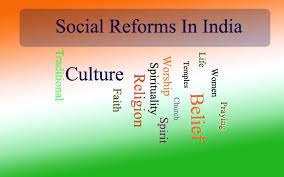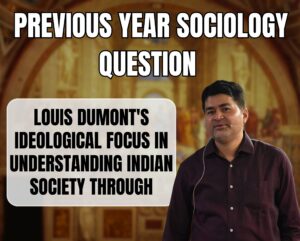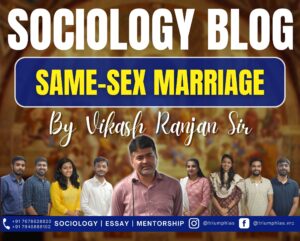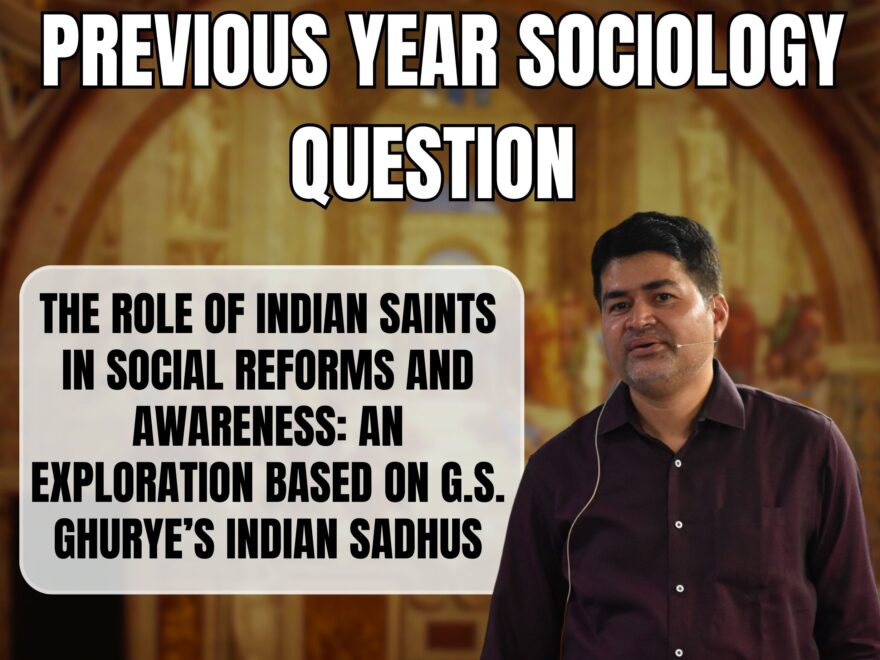Do You Think That the Indian Saints have Brought About Social Reforms and Awareness in Indian Society? Explain.
(Paper: 2, Section: A, Year 2019, Unit 11: Indian Society: Structure and Change, Impact of Colonial Rule on Indian Society)

Do you think that the Indian saints have brought about social reforms and awareness in Indian society? Explain.
(10 Marks)
|
Introduction: With Reference to G.S. Ghurye Indian Sadhus Main Body: Promotion of Social Reforms and Social Awareness and Change Various Dimensions Exploration Conclusion: On the Lines of Saints Conduits for Transmitting Knowledge and Interpreting it to Suit Specific Contexts |
Introduction
- Indian social tradition has long drawn upon the teachings and philosophies of prominent saints. Significance of saints in reforms and educating Indian society was recognised by sociologists like GS Ghurye in his book INDIAN SADHUS.
- The saints in social reforms and awareness has been evident in Indian society since ancient times, including the likes of Mahavira in Jainism and Gautama Buddha in Buddhism and Shankaracharya and Ramanujacharya in Hinduism. This continued into medieval India through the Bhakti traditions of Sikhism and Lingayats.
Main Body
Promotion of Social Reforms:
- Abolition of Social Evils: Indian saints have historically been at the forefront of campaigns against social evils such as untouchability, caste discrimination, and the mistreatment of women. They used their spiritual authority to challenge these practices and promote equality.
- Advocacy for Education: Many Indian saints, like Swami Vivekananda and Raja Ram Mohan Roy, emphasized the importance of education. They established schools and educational institutions to spread knowledge, particularly among marginalized communities.
- Promotion of Non-violence: They, advocated for non-violence and peaceful resistance during the Indian independence movement. His principles of non-violence had a profound impact on the freedom struggle.
- Women’s Rights: Saints like Swami Dayananda Saraswati and Ramakrishna Paramahamsa challenged prevailing norms related to the treatment of women. They advocated for women’s education and empowerment.
- Arbiters In Religious Disputes: Indian Sadhus have played diverse roles in society, acting as arbiters in religious disputes, patrons of scriptural learning, and defenders of their religion against external challenges.
Social Awareness and Change:
- Raising Consciousness: Indian saints have used their spiritual teachings and sermons to raise awareness about social issues. Through their discourses, they have encouraged people to think critically about societal norms and practices.
- Role in Struggle Against Britishers: the revolts like Sanyasi Revolt highlights the role of saints in Indian freedom struggle and highlighting exploitative policies of colonial rulers, even Swami Dayanand Saraswati and Swami Viveknanda led the path of nationalism.
- Inspiration for Social Activism: Saints like Vinoba Bhave and Baba Amte were not only spiritual leaders but also social activists. They inspired and mobilized individuals to engage in grassroots social reform movements.
- Represent A Microcosm of India: Sadhus, who participate in large-scale gatherings like the Kumbh Mela, represent a microcosm of India itself. They come from various regions, speak different languages, yet share common religious orders. Ghurye argues that asceticism is not a relic of the past but a vital aspect of contemporary Hindu practices.
- Bridge Between Communities: Saints often serve as bridges between different communities and castes. Their teachings promote unity and harmony, transcending divisions that have plagued Indian society.
- Strengthen And Improve Hinduism: Vivekananda, Dayanand Saraswati, and Sri Aurobindo have actively worked to strengthen and improve Hinduism. Their endeavors demonstrate that the tradition of renunciation, symbolized by Sadhus, continues to be a dynamic and vital force in shaping the religious and social landscape of India.
Dysfunctional analysis:
- Sometimes increased focus on Suddhi Movements and revivalist tendencies have created communal strife also and anomies in society.
- Some revivalist adventures of saints have supported social evils too in pursuit of glorification of past.
Conclusion
Apart from these criticisms Saints in Indian society have consistently contributed to awareness and social reforms. They have served as conduits for transmitting knowledge and interpreting it to suit specific contexts. Their roles, spanning from nationalist ideals to global integration, have played a pivotal role in shaping social systems over time.
Related Blogs …
 |
 |

To master these intricacies and fare well in the Sociology Optional Syllabus, aspiring sociologists might benefit from guidance by the Best Sociology Optional Teacher and participation in the Best Sociology Optional Coaching. These avenues provide comprehensive assistance, ensuring a solid understanding of sociology’s diverse methodologies and techniques.
META TAGS:
Indian Saints, Social Reforms, Social Awareness, G.S. Ghurye, Indian Sadhus, Spiritual Leaders, Women’s Rights, Education, Non-violence, Nationalism, Social Activism, Hinduism, Unity, Harmony, Indian Saints, Social Reforms, Social Awareness, G.S. Ghurye, Indian Sadhus
Why Vikash Ranjan’s Classes for Sociology?
Proper guidance and assistance are required to learn the skill of interlinking current happenings with the conventional topics. VIKASH RANJAN SIR at TRIUMPH IAS guides students according to the Recent Trends of UPSC, making him the Best Sociology Teacher for Sociology Optional UPSC.
At Triumph IAS, the Best Sociology Optional Coaching platform, we not only provide the best study material and applied classes for Sociology for IAS but also conduct regular assignments and class tests to assess candidates’ writing skills and understanding of the subject.
Choose The Best Sociology Optional Teacher for IAS Preparation?
At the beginning of the journey for Civil Services Examination preparation, many students face a pivotal decision – selecting their optional subject. Questions such as “which optional subject is the best?” and “which optional subject is the most scoring?” frequently come to mind. Choosing the right optional subject, like choosing the best sociology optional teacher, is a subjective yet vital step that requires a thoughtful decision based on facts. A misstep in this crucial decision can indeed prove disastrous.
Ever since the exam pattern was revamped in 2013, the UPSC has eliminated the need for a second optional subject. Now, candidates have to choose only one optional subject for the UPSC Mains, which has two papers of 250 marks each. One of the compelling choices for many has been the sociology optional. However, it’s strongly advised to decide on your optional subject for mains well ahead of time to get sufficient time to complete the syllabus. After all, most students score similarly in General Studies Papers; it’s the score in the optional subject & essay that contributes significantly to the final selection.
“A sound strategy does not rely solely on the popular
Opinion of toppers or famous YouTubers cum teachers.”
It requires understanding one’s ability, interest, and the relevance of the subject, not just for the exam but also for life in general. Hence, when selecting the best sociology teacher, one must consider the usefulness of sociology optional coaching in General Studies, Essay, and Personality Test.
The choice of the optional subject should be based on objective criteria, such as the nature, scope, and size of the syllabus, uniformity and stability in the question pattern, relevance of the syllabic content in daily life in society, and the availability of study material and guidance. For example, choosing the best sociology optional coaching can ensure access to top-quality study materials and experienced teachers. Always remember, the approach of the UPSC optional subject differs from your academic studies of subjects. Therefore, before settling for sociology optional, you need to analyze the syllabus, previous years’ pattern, subject requirements (be it ideal, visionary, numerical, conceptual theoretical), and your comfort level with the subject.
This decision marks a critical point in your UPSC – CSE journey, potentially determining your success in a career in IAS/Civil Services. Therefore, it’s crucial to choose wisely, whether it’s the optional subject or the best sociology optional teacher. Always base your decision on accurate facts, and never let your emotional biases guide your choices. After all, the search for the best sociology optional coaching is about finding the perfect fit for your unique academic needs and aspirations.
Follow us :
🔎 https://www.instagram.com/triumphias
🔎https://www.youtube.com/c/TriumphIAS
https://t.me/VikashRanjanSociology
Find More Blogs
|
Scope of the subject and comparison with other social sciences |
|||
|
|
|
|
Modernity and social changes in Europe |

